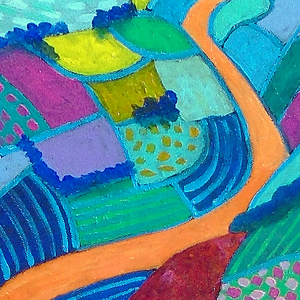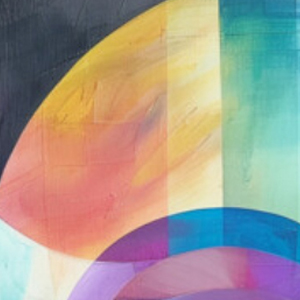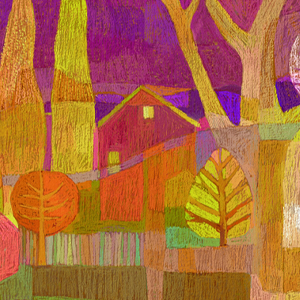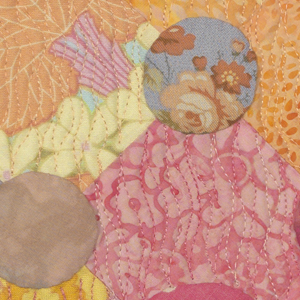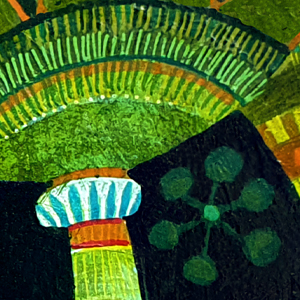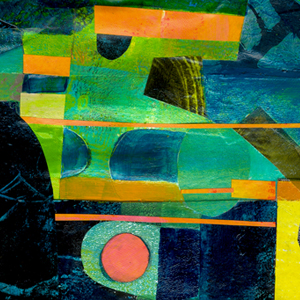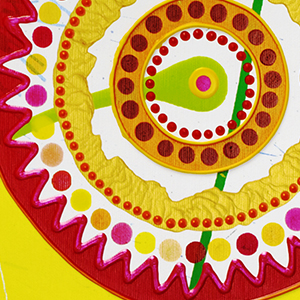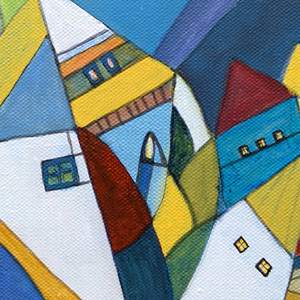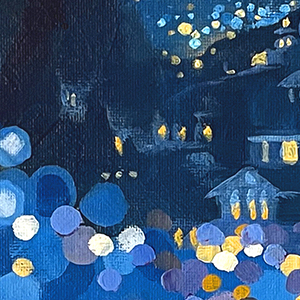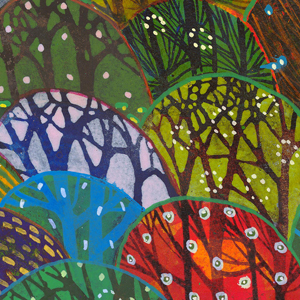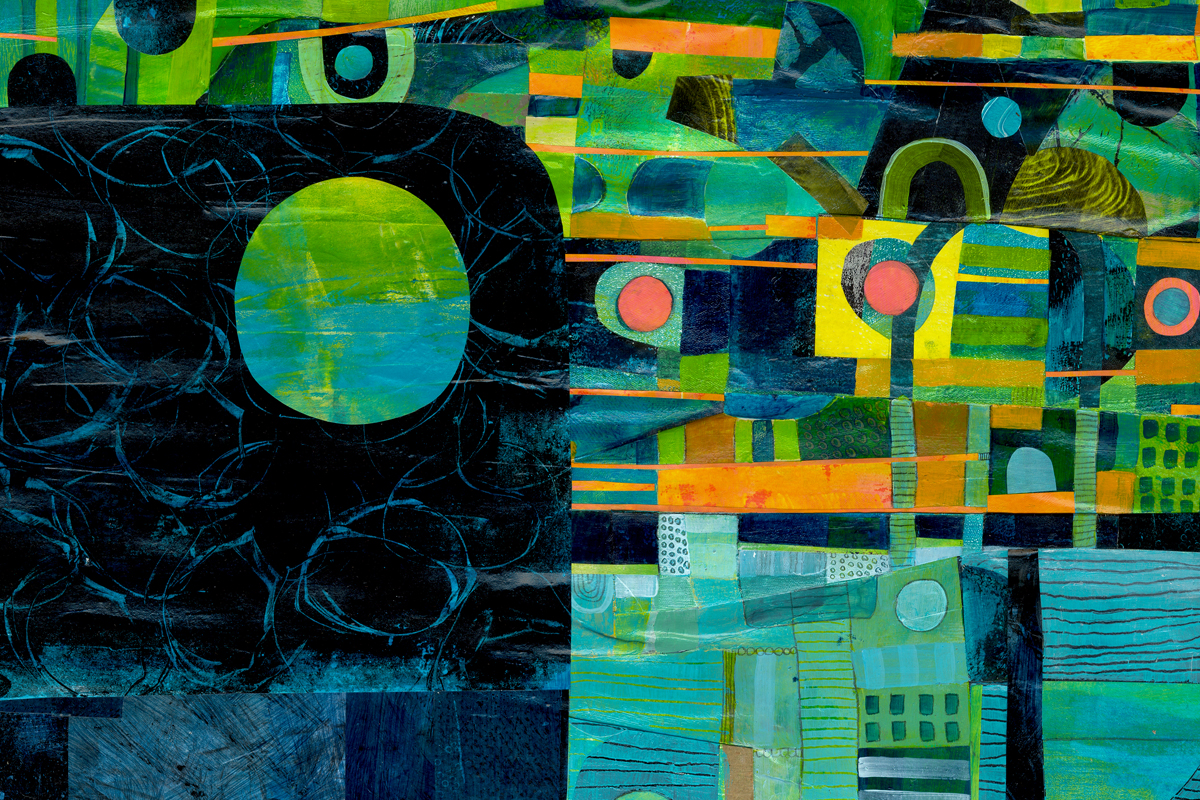
INterlude
Defining Moments
Artwork: “Threads” by Charlotte Wensley © 2022
“The fusing of faculty expertise with courageous and curious young people is why universities remain the crown jewel of our nation.” —Sian L. Beilock, President, Dartmouth
When we talk about cultivating civil disagreement and courage of convictions on and off campus what are signs of hope? What are challenges to overcome?
We asked campus and cultural leaders to respond to these questions and share their perspectives on the current climate. Here’s what they said.
Sian L. Beilock
President, Dartmouth
Signs of Hope
Cultivating dialogue is at the heart of the university’s mission. At Dartmouth, it’s also integral to our north star—finding the most promising students from the broadest swath of society, teaching them how to think (not what to think), and giving them the skills to debate and disagree productively so they can go out and be the next leaders of the free world.
There are a growing number of institutions that are committed to increasing opportunities and creating more spaces on campus for freedom of expression and dialogue across difference. These efforts are critical. But just as often, it’s our students who are leading the way.
At Dartmouth, groups like the nonpartisan Dartmouth Political Union are only one example of students actively working to bridge divides and to create spaces for respectful dialogue. With support from faculty, staff, and alumni who care deeply about their success, these students are not only engaging in civil disagreement themselves but are encouraging their peers to do the same, setting an example of what constructive engagement can look like. Their efforts, often overlooked in depictions of campus life, demonstrate the importance of listening to and learning from others—even when views diverge. They should be held up and celebrated for cultivating brave dialogue on our college campuses.
The fusing of faculty expertise with courageous and curious young people is why universities remain the crown jewel of our nation. Our institutions have always been the center of academic discovery and innovation when all ideas can flourish. Research shows a diversity of viewpoints at the table, working together, leads to better outcomes. When universities do this well, we expand our ability to create new knowledge and solve the world’s most pressing issues.
Challenges to Overcome
Achieving a community where civil disagreement and courage of conviction can thrive requires overcoming formidable challenges—polarization chief among them. This growing phenomenon in all of our lives has intensified societal divisions, making it harder for students to feel comfortable engaging across lines of difference. Social media often amplifies this challenge, creating echo chambers that discourage nuanced conversation and that reward quick, impassioned reactions over thoughtful engagement.
To create environments where students can disagree civilly, universities must help them develop and practice the skills to listen actively, empathize, and find common ground, even when opinions differ sharply.
Faculty can play a critical role in this work by modeling civil discourse for students as well as creating classroom environments where respectful debate can thrive. At Dartmouth, our Jewish Studies and Middle Eastern Studies faculty have a long history of co-teaching classes, and set a powerful example for students by demonstrating how to learn and engage with one another on complicated, emotionally charged issues. Those models are further strengthened if academics and administrators leave our own personal political opinions at the door.
Just as we train our bodies for vigorous workouts, we can train our brains—and our students—for vigorous debate while also respecting the humanity of the person sitting across from us.

Sian L. Beilock is the 19th president of Dartmouth. Beilock is one of the world’s leading experts on the brain science behind “choking under pressure” in business, education, and sports. She is the author of Choke and How the Body Knows Its Mind.
Jennifer Frey
Dean of the Honors College and Professor of Philosophy, University of Tulsa
Civility is a key virtue for any community, because without it the mutual respect necessary for communities to thrive is absent. Civility is a civic virtue, and so ordered to the common good of some community. A civil person is disposed to see others as their moral equal—as possessing equal value and dignity as oneself—and thus is disposed to treat others with the respect they are owed in light of that perceived equality. This perception of equal value and worth is not conditional—the perception of the dignity and value of the other does not change considering how the other person behaves or what the other person believes.
Civil discourse, then, occurs between persons who see their interlocutors as deserving respect unconditionally. This respect is based in the recognition that both conversation partners are searching for the truth in good faith and are open to being wrong and changing their mind. A civil exchange might be heated and frustrating, but it will not involve treating the participants in the exchange as unworthy of respect. Exchange becomes uncivil when participants resort to name calling, yelling, ad hominem attacks, or other forms of behavior that violate norms of respect that are recognized in the community.
One challenge that arises on our campuses today is that civility is no longer a norm that is valued but is actively contested and opposed. It has frequently been labeled as racist and connected to white supremacy, for example, and cast as a tool for silencing dissenting voices focused on bringing about just ends. Another challenge is that many debates take place in online spaces that not only do not encourage civil exchange, but are structurally set up to undermine it. Finally, there is the challenge of polarization and the lack of shared common ground. These are conditions in which civility is difficult to cultivate.
While these challenges are formidable and complex, there are signs of hope. Many students are hungry for spaces where civil exchange and fearless pursuit of the truth is not only valued but actively encouraged and cultivated. Students want places where they can freely explore ideas and arguments without fearing reprisals or condemnations, and they are also eager to learn the rules of respectful engagement. In short, they want to learn and grow as thinkers and citizens. Precisely because civility is being challenged in the contemporary academy, we have an opportunity to explain what civility is and model how it should function in practice. While calls for civility have been miscast or misused in the past, this should not discourage us from addressing the connections between civility, justice, courage, and humility.
As we proceed to build civil spaces of disagreement on campus, we must remain focused on the role of civility to our learning communities, and how civility functions to help us learn and grow together as seekers of truth and wisdom as a common good. While civility is not always easy, it is necessary for us to learn, grow, and belong on campus.

Jennifer Frey is the inaugural dean of the Honors College at The University of Tulsa and professor of philosophy in the Department of Philosophy & Religion. She is a faculty fellow at the Institute for Human Ecology at the Catholic University of America and a Newbigin Interfaith Fellow with The Carver Project.
Roosevelt Montás
Director of the Center for American Studies’ Freedom and Citizenship Program, Columbia University
Signs of Hope
In the fall and spring of every year, I teach American and Western political thought to undergraduates at a highly selective college. During the summers, I teach the same material to high school students from low-income households who aspire to be the first in their families to attend university. With almost every classroom conversation I have with these young people, my faith in the possibilities for democratic life and civic renewal in our society is strengthened. Grappling with fundamental questions through reading and discussing texts that shaped the contemporary world proves to be, again and again, transformative for the civic life of my students. This happens not only because of the power of the provocations that the texts offer us, but because of the character of the community of discourse that these courses naturally spawn. As the teacher, my primary role is to set the tone for the classroom conversation—one in which my own authority on the most important questions is necessarily tenuous and tentative, driven more by curiosity about how others view the world than by convictions in the correctness of my views. In my experience, students slip into this same mode of inquiry and “debate” quite naturally. Once this affective community has taken hold, the kind of civility, humility, and interest in the views of others that makes democracy possible follow as a matter of course. It is the witnessing of this miracle that continually fortifies my faith in the possibilities for our future.
Challenges to Overcome
Strong convictions are not rare among students. The courage to express them is harder to come by, and requires cultivation and encouragement. But this is not the primary challenge I encounter as a teacher. Much harder to cultivate, and more important, is the courage of uncertainty and doubt, the capacity to sit with tentativeness and confusion. To achieve truly civil disagreement and truly productive dialogue about these disagreements, it is the loosening of convictions, not the courage to hold them, that we must cultivate in our students. The idea that intellectual authority comes from certainty, self-confidence, and strength of conviction is in fact an anti-intellectual posture that impedes inquiry and growth. Strong convictions and settled beliefs are precisely what true education destabilizes, creating the space in which new ideas and insights can emerge. We should teach our students to seek, and seek ourselves, the thrill of discovering that we are wrong. We should teach our students, and practice ourselves, the seeking out of contrary points of view and the enriching of our opinions by generous intercourse with their opposites. Conviction and certainty—in our students in ourselves—is a primary obstacle to our capacity to tackle together our common problems.
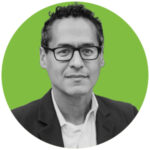
Roosevelt Montás is Senior Lecturer in American Studies and English at Columbia University. He is Director of the Center for American Studies’ Freedom and Citizenship Program and author of Rescuing Socrates: How the Great Books Changed My Life and Why They Matter for a New Generation.
Eboo Patel
Founder and President, Interfaith America
Signs of Hope
For the last ten years, the social change sector has been symbolized by the raised fist. For me, the message that sends is simple: I’m going to pound you into agreeing with me. I don’t think that’s a good approach to sustainable social change. It generates too many enemies, and even the people who comply may do so because they felt forced. One of the principles that social change greats like Gandhi, Mandela, and Martin Luther King Jr. understood was the importance of turning enemies into friends precisely because you have to live with the people you defeat. I prefer the diverse hands clasped together approach to social change, rather than the raised fist mode, and I’m seeing more of it. You hear it in the commentary of media figures like Van Jones and nonprofit leaders like Tulaine Montgomery of New Profit. You also see it on shows like FX’s The Bear (also available on Hulu). It’s a show about people from a range of different backgrounds working together to create a great restaurant. That’s the spirit that we should be taking into all of our social change work – diverse people cooperating together to lift everyone up. It is especially meaningful to me that The Bear is based in the city of Chicago, the same city that the great poet Gwendolyn Brooks called home. She wrote one of my favorite lines of all time about social change: “Even if you are not ready for day / it cannot always be night.”
Challenges to Overcome
I was reading an article a few years ago on how our cultural divide maps onto our geographical divide. Over 70% of counties that have a Whole Foods vote for Democrats, and roughly the same percentage of counties with a Cracker Barrel vote for Republicans.1 I was so taken by that datapoint that I mentioned it at dinner with my family that night. My son’s response: “What’s Cracker Barrel?” That tells the whole story. It’s not just that we live deep in our own territory, it’s that we basically ignore people from across the cultural/geographic divide. A diverse democracy rests on its citizens, even as they advocate for different causes and vote for different candidates, expressing the conviction that the lives of their fellow citizens matter. That requires that we are curious about one another. But the geographic/cultural divide, symbolized by the Whole Foods/Cracker Barrel datapoint, makes it hard to come to know one another. We live too far apart to go to the same schools or play in the same basketball leagues. And social media, which could theoretically transcend the divide, has seemed to only harden it. We are even farther apart when we are online than we are when we are on our drives to work. In previous generations, military service offered a common experience, and key figures like Walter Cronkite served as common cultural reference points. The closest we come now, I think, is the Olympics. But that’s only for two weeks every two years. We’re going to have to figure out how to bridge across the divide far more often than that.
NOTE
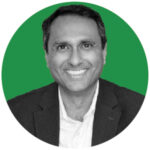
Eboo Patel, Founder and President of Interfaith America, is working with universities, government officials, civic leaders, and corporations to make faith a bridge of cooperation rather than a barrier of division. He is the author of five books, including We Need to Build: Field Notes for Diverse Democracy.
Deondra Rose
Kevin D. Gorter Associate Professor of Public Policy, Political Science, and History, Sanford School of Public Policy, Duke University
Signs of Hope
As a scholar of U.S. higher education politics and policy, I spend a great deal of time thinking about the purpose of higher education and the relationship between higher education and democratic citizenship. Fostering civic dialogue on campus and beyond strikes me as one of the greatest contributions that colleges and universities can make to society. Between 2021 and 2024, I served as the director of Polis: Center for Politics at Duke University’s Sanford School of Public Policy, and during those years our team built our programs and activities around the theme of “Discourse for Democracy.” Through formal events, informal conversation sessions, workshops, and even an arts competition, we provided numerous opportunities for students and our broader community to develop and practice skills that are crucial for having transformative conversations across differences—such as active listening, dissenting effectively, demonstrating respect for others, displaying authenticity, approaching conversations with an open mind, and making space for others to contribute to conversations. I was struck by the ever-expanding landscape of organizations willing to partner with such efforts and the plethora of resources available to faculty, staff, students, and community members committed to fostering civil and potentially transformative dialogue. Moreover, the willingness of students, faculty, staff, and alumni to join in intergenerational conversations also gave me much hope.
Challenges to Overcome
To cultivate civil disagreement and courage of convictions, we must overcome two challenges. First, we must create environments where interlocutors feel comfortable approaching conversations with an open mind and engage to achieve greater understanding. For students—and faculty, staff, and community members—this may require important behavioral shifts. For many students, the pathway from high school to college was forged by their ability to “win,” to be “right,” and to show that they had all the answers. As college educators, our job is to foster an environment of intellectual humility where students feel free to bring their full, authentic selves to conversations, to consider the merits of differing opinions (even if they do not ultimately agree with them), to admit when they don’t know something, and to change their minds. Helping students get there will take intentional guidance at every stage of the college experience.
The second challenge is figuring out how to effectively foster free expression and belonging in increasingly diverse communities. Many conversations about civil discourse fail to venture beyond extoling the virtues of respectful dialogue and enumerating best practices for ensuring that difficult conversations remain constructive. Discussing difficult topics with diverse groups can be challenging. When conversations touch directly on some participants’ identities and/or lived experiences, the risks incurred by participating are different than they would be if the topic were simply of abstract or theoretical relevance. An intentional approach to guiding these conversations is imperative.
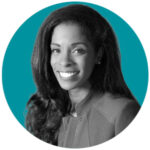
Deondra Rose is the Kevin D. Gorter Associate Professor at the Sanford School of Public Policy with secondary appointments in the Department of Political Science and the Department of History. She is the author of the new book The Power of Black Excellence: HBCUs and the Fight for American Democracy.
Michael Roth
President, Wesleyan University
So many are by now tired of organized efforts to have us exclude another person or group as “beyond the pale.” While it may be that demonization works for political consultants, it is poisonous for our political culture. When you can turn your opponent into an existential threat, or when you can claim that your opponent is allied with the mortal enemies of your way of life, you may have a better chance of gaining supporters. But you are eroding the possibilities for the collaborative work we so desperately need.
I find hope when I see that many of my students are eager to understand people with whom they believe they disagree on fundamental questions. They seem to realize that even if we don’t agree about a military conflict or about other political issues, we can work for peace, for mutual understanding, and for the ability to continue to learn together. Many have begun to recognize that living in a bubble of like-mindedness does not facilitate understanding; it simply rewards complacency. If all participants in the conversation share the same assumptions, one never has to legitimate them (and thus understand them more profoundly). That’s why diversity is an educational issue and not just a question of political fairness.
There are signs that students want to do better. Instead of rewarding condescension toward those with whom they disagree, many schools are eager to enhance the consideration of alternative perspectives on culture and society. As civil discussion becomes increasingly rare in the public sphere, it is more important than ever to cultivate the soil for it on our campuses.
The challenges to civil discussion are everywhere apparent. America is in another period of organized parochialism, and so it’s not surprising to find this on our college campuses. All across the country, groups are enclosing themselves in bubbles for protection from competing points of view, even from disturbing information. This has always happened to some extent; it’s easier to be with people who share your views.
Today, however, we are able to curate the information we receive so that we are validated more than we are informed. These days some have noted that we live in a “winner take all economy” in which people seem to feel that if they don’t hoard resources, they will just be losers. Similarly, many seem to think that entertaining ideas from those who don’t share all your views is a sign of weakness. Rather than opening ourselves up to difference, many seem to look to the exchange of ideas merely as a path to confirming their own views.
We must overcome our fear of the other and our fear of being wrong. We can develop strong convictions while maintaining an openness to civil conversation with those who might disagree with us. We must overcome the notion that it is a fault to discover that one is mistaken, or just different. We must instead see this discovery as a gift.

Michael S. Roth has been president of Wesleyan University since 2007 and has taught in the humanities since 1983. He was the founding director of the Scripps College Humanities Institute and the president of the California College of the Arts. He is the author of eight books, the most recent of which is The Student: A Short History.
Spring 2025
Part I: Defining Virtue
James Arthur
Dayna L. Cunningham
Greg Lukianoff
Najeeba Syeed
Interlude: Defining Moments
Part II: Defining Vocation
MORE





